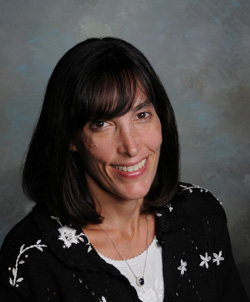Keith E. Mellinger, associate professor and chair of the department of mathematics, and former UMW student Jake Farinholt coauthored the article “Minimal generators for BCH codes” published in spring 2011 issue of The Pi Mu Epsilon Journal, an official publication of the national honorary mathematics society.
Laurie Abeel
Laurie Abeel, associate professor of Graduate Education and Program Director for Advanced Licensure, is also the State Director for Destination ImagiNation (DI), a creative problem solving program for ages four through college level. She and her state board successfully ran the April 2 state tournament, which included 97 teams from around the state, with about 1,500 people attending.
Abeel will take 41 teams from Virginia to Global Finals to be held in May at the University of Tennesee in Knoxville, where more than 1,000 teams from around the country and world will present creative solutions to DI challenges. For more information about DI, go to www.idodi.org.
Kathryn Loesser-Casey and Debra Hydorn
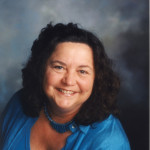
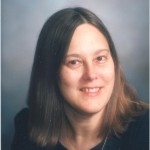 Kathryn Loesser-Casey, professor of biological sciences, and Debra Hydorn, professor of mathematics, gave the poster presentation “Putting BIO2010 Into Practice: A Course on the Research Process for STEM Majors” at the Association of American Colleges and Universities conference “Engaged STEM Learning: From Promising to Pervasive Practices” held in Miami in March. The poster presentation provided an opportunity for Hydorn and Loesser-Casey to share information about the UMW course, Biology 260 The Research Process, with faculty from across the STEM disciplines.
Kathryn Loesser-Casey, professor of biological sciences, and Debra Hydorn, professor of mathematics, gave the poster presentation “Putting BIO2010 Into Practice: A Course on the Research Process for STEM Majors” at the Association of American Colleges and Universities conference “Engaged STEM Learning: From Promising to Pervasive Practices” held in Miami in March. The poster presentation provided an opportunity for Hydorn and Loesser-Casey to share information about the UMW course, Biology 260 The Research Process, with faculty from across the STEM disciplines.
Jason Davidson
Jason Davidson, associate professor of political science and international affairs, will discuss his new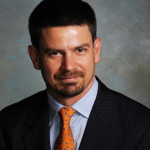 book, “America’s Allies and War: Kosovo, Afghanistan, and Iraq,” during a book forum at the Cato Institute in Washington, D.C., on Tuesday, May 10 at 4 p.m.
book, “America’s Allies and War: Kosovo, Afghanistan, and Iraq,” during a book forum at the Cato Institute in Washington, D.C., on Tuesday, May 10 at 4 p.m.
The book forum is free and open to the public. Advance registration is required for all Cato events. Seating is limited. The forum also will be streamed live over the Internet. For more information, visit http://www.cato.org/event.php?eventid=7943.
The website says, “The United States pledges to defend our NATO allies under Article V of the North Atlantic Treaty. Why, and in what ways, do the allies reciprocate? Jason Davidson will present evidence from his unique analysis of transatlantic burden-sharing to explain why Britain, France, and Italy provide or refuse military support for U.S.-led uses of force. Sixty original interviews with top policymakers and analysts provide insight into allies’ decisions regarding the Kosovo War (1999), Afghanistan (2001), and the Iraq War (2003). Davidson shows that such decisions reflect a combination of factors such as alliance value, threat, prestige, and electoral politics. Join us for a discussion that will include recommendations for how U.S. policymakers can increase the allies’ contributions to global security, and shift some of the burdens of defense off the shoulders of American taxpayers.”
Claudia Emerson
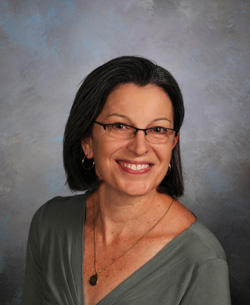 Claudia Emerson, English professor and Pulitzer Prize-winning poet, will be inducted into the prestigious Fellowship of Southern Writers during its biennial meeting to be held during the April 14-16 Conference on Southern Literature.
Claudia Emerson, English professor and Pulitzer Prize-winning poet, will be inducted into the prestigious Fellowship of Southern Writers during its biennial meeting to be held during the April 14-16 Conference on Southern Literature.
Emerson will be welcomed into the fellowship alongside 11 other distinguished writers including Harper Lee, author of the Pulitzer Prize-winning bestseller “To Kill a Mockingbird.” As part of Emerson’s induction, she will participate in a panel discussion of revision as an element of the writing process during the conference in Chattanooga, Tenn.
Emerson won the 2006 Pulitzer Prize in Poetry for “Late Wife.” She has written five books of poetry, with a sixth forthcoming. A former Virginia poet laureate who joined the UMW faculty in 1998, she holds the Arrington distinguished chair of poetry at Mary Washington. Emerson received the Donald Justice Award for poetry from the fellowship in 2009.
A highly selective organization that seeks to recognize and encourage literature in the South, the fellowship was founded in 1987 by a group of predominantly male writers that included James Dickey, John Hope Franklin, Walker Percy, Elizabeth Spencer, Robert Penn Warren and Eudora Welty.
New fellows are nominated by current members and elected by majority vote. Fellows are writers of fiction, poetry, drama, criticism and history. Most members have been fiction writers because of the powerhouse world of Southern fiction writing. However, Emerson said that is slowly changing. “As a female poet, it was harder to get in,” she said.
Members aren’t separated by their style of writing, so new ones are judged against all other Southern writers and editors, regardless of genre, Emerson said. “I’m very excited to see fellow writers and colleagues who are already in it and who are being inducted into it now,” Emerson said. “They don’t limit to creative writers necessarily.”
To be considered for membership, a writer must have been born and raised or have resided for a significant part of his or her life in the South, or have written works that in character and spirit embody aspects of the Southern experience.
Emerson said members also include historians, editors, biographers and critics, which is a unique trait for the fellowship. “It’s sort of a broader consideration of what it is to be a ‘writer’,” she said. “I’m excited and honored and always interested in being a part of something that’s trying to promote good writing.”
Emerson also is excited about attending the conference, where she will interact with many writers whom she admires. “I imagine there will be a couple of good parties where you can put on your party dress and meet people you’ve admired forever,” she said.
The fellowship holds its biennial meetings during the Chattanooga Arts & Education Council Conference on Southern Literature in Chattanooga, where the fellowship’s archives are held at the University of Tennessee Lupton Library. At their meeting, the fellows elect new members, bestow awards on established and emerging writers, and deliver readings and lectures.
Jason Davidson
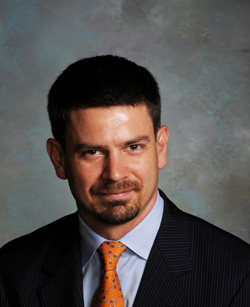 Jason W. Davidson, associate professor of political science and international affairs, had the column “America’s Allies and Libya: Why Coalitions Make Sense” published March 30 in the Aspen Institute Italia’s foreign affairs journal.
Jason W. Davidson, associate professor of political science and international affairs, had the column “America’s Allies and Libya: Why Coalitions Make Sense” published March 30 in the Aspen Institute Italia’s foreign affairs journal.
Read the column at http://www.aspeninstitute.it/aspenia-online/article/america%E2%80%99s-allies-and-libya-why-coalitions-make-sense.
In addition, Davidson has the book ”America’s Allies and War: Kosovo, Afghanistan, and Iraq” scheduled for release in April by Palgrave Macmillan.
Visit http://us.macmillan.com/americasalliesandwar to learn more about the book, which is especially relevant in light of the unrest and war in Libya.
The publisher’s summary says, “Why do Britain, France, and Italy provide or refuse military support for U.S.-led uses of force? This book provides a unique, multiple-case study analysis of transatlantic burden-sharing. Sixty original interviews with top policymakers and analysts provide insight into allies’ decisions regarding the Kosovo War (1999), Afghanistan (2001), and the Iraq War (2003). The cases show that neoclassical realist factors–alliance value, threat, prestige, and electoral politics–explain allies’ decisions better than constructivist factors–identity and norms. The book briefly covers additional cases (Vietnam, Lebanon, the Persian Gulf War, Somalia) and concludes with recommendations for increasing future allied military support.”
In Patricia A. Weitsman’s endorsement, the Ohio University political science professor writes, “Jason W. Davidson’s exceptional book is a must read for scholars and policy makers interested in knowing why states put troops in harm’s way for the benefit of their allies. Davidson’s masterful explanation of burden sharing is essential knowledge for students of history and politics, as well as decision makers crafting strategy for the future.”
Emile Lester
Emile Lester, assistant professor of political science and international affairs, wrote a March 21 guest blog post for the Washington Post about whether religion can be taught in public schools. He finds hope for improving civil discourse on religion through an innovative course offered in the Modesto, Calif., public school system. Check out Lester’s blog post at http://www.washingtonpost.com/blogs/political-bookworm/post/a-path-to-religion-in-the-classroom/2011/03/08/ABwNKy7_blog.html.
In addition, Lester has the forthcoming book “Teaching about Religions: A Democratic Approach for Public Schools,” which is due for release soon by the University of Michigan Press. Visit http://press.umich.edu/titleDetailDesc.do;jsessionid=96706B2E5A1D7240FDFF52E73627E189?id=2180004 to learn more.
The publisher’s summary of Lester’s book says, “Frequent news stories about the debates waged between secularists and religious conservatives have convinced most Americans that public schools must choose between promoting respect for religious minorities and respecting the interests of conservative Christians. As a result, public schools fail to teach students about the meaning and value of protecting religious liberty and consequently perpetuate mistrust across the cultural divide, further empower extremists, and obscure the fact that most Americans of all religious backgrounds share a commitment to basic democratic principles.”
“In response, the public schools in the religiously diverse and divided community of Modesto, California, have introduced a widely acclaimed required world religions course. Drawing on groundbreaking research on the creation of and response to the Modesto course as well as on political philosophy, Emile Lester advocates a civic approach to teaching about religion in public schools that at once emphasizes respect for all views about religion and provides a special recognition of conservative Christian beliefs.”
Charles C. Haynes, the Freedom Forum First Amendment Center senior scholar, writes in an endorsement, “This provocative and timely book challenges Americans to rethink what it means to take democracy and religious freedom seriously in public education. Emile Lester takes the reader beyond culture war conflicts rooted in religious divisions and offers bold, new solutions for addressing our differences with fairness and robust toleration. Instead of battlegrounds, he argues, public schools can and should be places that include all voices in ways that prepare citizens to engage one another with civility and respect. “Teaching about Religions” is essential reading for all who care about the future of public schools—and the health of American democracy.”
Mindy Erchull
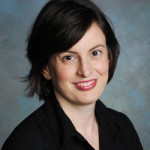 Mindy Erchull, assistant professor of psychology, has received the 2011 Psi Chi Southeastern Regional Faculty Advisor Award for her active involvement as the university’s Psi Chi chapter advisor.
Mindy Erchull, assistant professor of psychology, has received the 2011 Psi Chi Southeastern Regional Faculty Advisor Award for her active involvement as the university’s Psi Chi chapter advisor.
The award is presented annually to one Psi Chi faculty advisor per region who best demonstrates Psi Chi’s purpose of encouraging excellence in scholarship, particularly in psychology, and advancing the science of psychology. The Psi Chi Southeast region includes Alabama, Florida, Georgia, Kentucky, Mississippi, North Carolina, Puerto Rico, South Carolina, Tennessee, U.S. Virgin Islands, Virginia and West Virginia. Erchull’s award was announced during UMW’s Psi Chi spring induction ceremony on March 10.
Since becoming the university’s Psi Chi advisor in 2006, Erchull has facilitated programs already in place and helped chapter officers to add more workshops to assist students in preparing for graduate school and job applications. In addition, she has traveled with past chapter presidents to national leadership conferences sponsored by Psi Chi, and the university chapter was under Erchull’s guidance when the group received a regional chapter award in spring 2010.
In addition to serving as the chapter’s advisor, Erchull has served as a faculty consultant to Psi Chi for three years, reviewing grant and award applications and serving as a reviewer for the “Psi Chi Student Research Journal.” In addition, Erchull has served as president of the campus Phi Beta Kappa chapter and has been a member or a convener of several Phi Beta Kappa committees.
In 2010, she received the Mary Roth Walsh Teaching the Psychology of Women Award at the American Psychological Association Convention. The award, sponsored by the Society for the Psychology of Women, recognizes a young faculty member who employs innovative methods to address issues of diversity in teaching the psychology of women.
Erchull, a member of the UMW faculty since 2005, received a Ph.D. and a master’s degree in social psychology from Arizona State University and a bachelor’s degree in psychology from Connecticut College. Her research focuses on such issues as objectification, feminism and psychological aspects of reproductive health.
She has been a reviewer for the Association for Women in Psychology, the Society for Menstrual Cycle Research, and the American Psychological Association conference submissions and a reviewer for publications that include “Sex Roles,” “Women’s Studies” and “Health Care for Women International.” She is also a consulting editor for “Psychology of Women Quarterly.” Her own articles have appeared in “Psychology of Women Quarterly,” “Sex Roles” and “Health Psychology,” among other academic journals.
Erchull is co-chair of the Hyde Graduate Student Research Grants Committee for the Society for the Psychology of Women. Her professional memberships include the American Psychological Association, Association for Psychological Science, Association for Women in Psychology, Society for Menstrual Cycle Research, Society for Personality and Social Psychology, Virginia Academy of Academic Psychologists and the Virginia Psychological Association.
Doug Sanford
 Douglas W. Sanford, professor and chair of the Department of Historic Preservation, contributed the article “Slave Housing” to the two-volume World of a Slave: Encyclopedia of the Material Life of Slaves in the United States, edited by Martha B. Katz-Hyman and Kym S. Rice (Greenwood, 2011).
Douglas W. Sanford, professor and chair of the Department of Historic Preservation, contributed the article “Slave Housing” to the two-volume World of a Slave: Encyclopedia of the Material Life of Slaves in the United States, edited by Martha B. Katz-Hyman and Kym S. Rice (Greenwood, 2011).
Much of the information for Sanford’s article developed out of a National Endowment for the Humanities grant project headed by Sanford and Dennis Pogue, of George Washington’s Mt. Vernon, on the variety of housing arrangements for slaves in Virginia, based on archaeological, architectural, and documentary evidence.
Esther Yook
 Esther Yook, director of the UMW Speaking Center, presented “Communication Centers Spanning the Continent: Visual Ideations and Models” and “Communication Centers as the Golden Gate of Oral Communication: Great Ideas for the Center” at the annual convention of the National Communication Association in San Francisco, Calif., in November. At the same conference, Yook also served as a poster session judge and as chair of the paper session “If You Build It, They May Come: Empirically Identifying Motivations Surrounding the Use of Communication Centers.”
Esther Yook, director of the UMW Speaking Center, presented “Communication Centers Spanning the Continent: Visual Ideations and Models” and “Communication Centers as the Golden Gate of Oral Communication: Great Ideas for the Center” at the annual convention of the National Communication Association in San Francisco, Calif., in November. At the same conference, Yook also served as a poster session judge and as chair of the paper session “If You Build It, They May Come: Empirically Identifying Motivations Surrounding the Use of Communication Centers.”
